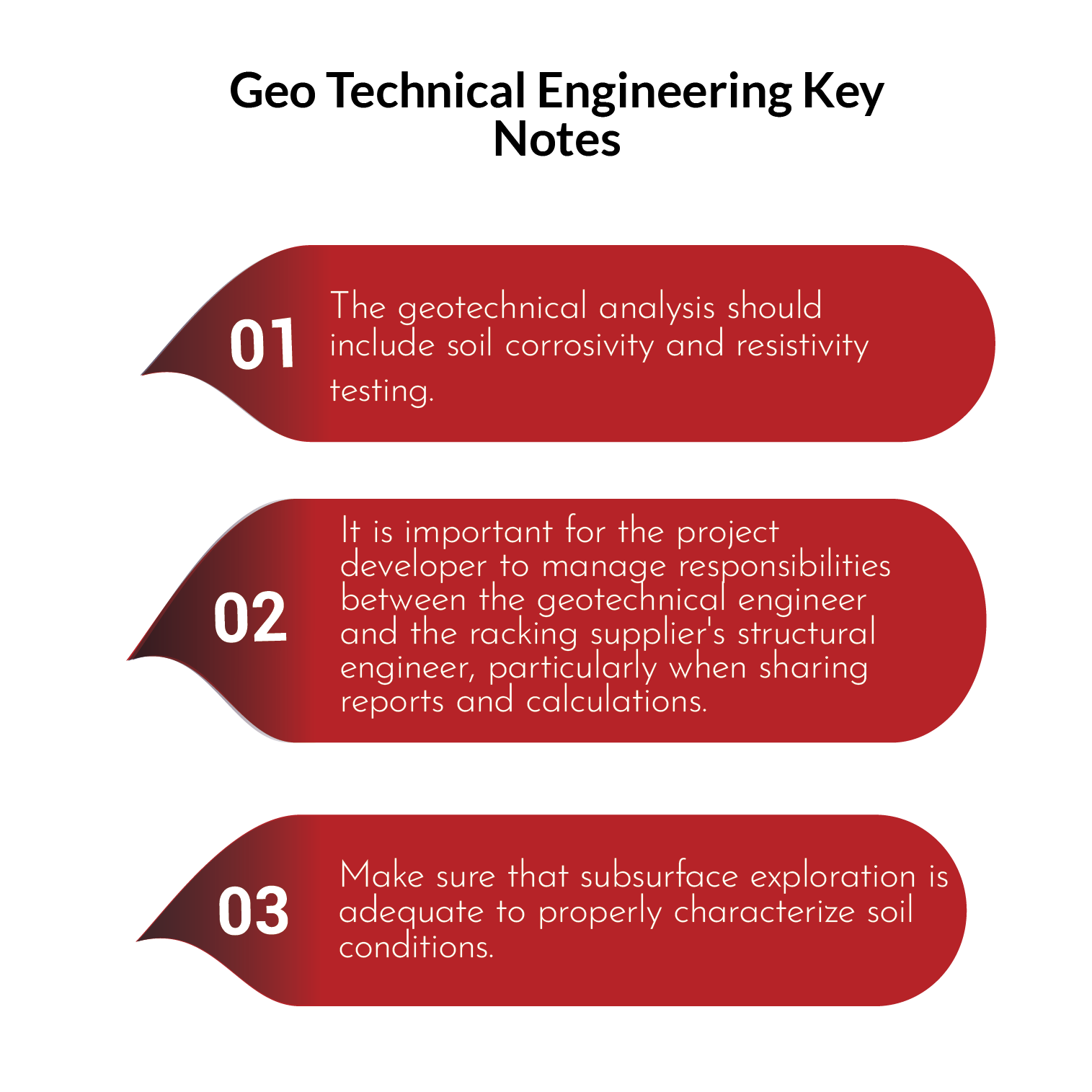Utility-scale and large commercial ground-mounted solar systems are becoming more and more common. Ground conditions are a massive part of solar projects. A potential solar project’s ground condition can massively impact many design considerations, most importantly, what foundation to choose. However, the design foundation depends upon various parameters i.e., geographical location, soil type, groundwater level, topography, and corrosion potential.
A well-designed solar foundation should be cost-effective without sacrificing reliability. While the design structure associated with ground-mounted PV systems may be small compared to those for other structures, the foundation still should support considerable dynamic loads. Whereas, Inadequate site assessments can lead to inadequate and unnecessarily expensive foundations. We, at Zigron, have Geotechnical engineers who can help solar companies investigate solar sites, and increase project safety and reliability while reducing project costs, and incorporating the best practices.
Solar Foundation Design Timeline
Ground-mounted PV power plants require two basic design requirements; Geo-Technical Engineering and Structural Engineering. Geotechnical engineers focus on evaluating the soil mechanics so that foundation design can incorporate these characteristics. Understanding the significant aspects of geotechnical engineering for solar foundation design will help support better decision-making before and during construction.
The first significant aspect of the Solar Rack Design Foundation requires a review of the racking-induced loads, i.e., wind, snow, and seismic loads, and the geotechnical design loads (such as frost design depth and freeze pressure). The fundamental challenge in a solar-specific geotechnical site assessment is to gather data about site characteristics – including soil composition, bearing capacity, level of groundwater, and surface water runoff. This helps characterize soil strength sufficiently to allow for foundation optimization.
The second significant aspect is the Onsite Geotechnical Investigation. This usually consists of a subsurface investigation which includes a preliminary site visit, test pit or borehole testing, and subsurface profile development for initial pile design as soil conditions vary across every site, both vertically and horizontally. Normally soils are horizontally layered deposits composed of particles ground down and transported from their parent material over time by motive forces, i.e., water, wind, volcanism, glaciers, and any seismic activity.
Another thing involved in the geotechnical investigation is Pre-production Testing. Pre-production testing of the piles helps verify design assumptions, assess constructability, develop a better understanding of subsurface consistency, and reduce the risk during construction through optimizing design considerations.
This process allows the geotechnical engineers to directly inspect ten cubic yards or more of soil to identify and document soil boundaries, seasonal high-groundwater level, percentage, rock size fragments, and so forth. Regardless of what the sampling method is, a geotechnical engineer ensures to maintain a log of the soils encountered and the sampling depth. Subsequently, a geotechnical report identifies the approximate location of all boreholes or test pits on the site map. The report also includes a logging entry for each location that identifies the soil classification in relation to the sampling depth, plus the depth of any groundwater encountered. A comprehensive geotechnical investigation characterizes soil corrosivity, which oxygen, moisture, and chemicals influence. Ensure foundation longevity in corrosive soils requires protective coatings, thicker piles, or sacrificial anodes.

Zigron offers more…
Zigron has more than ten years of experience with solidifying solar foundations. If you are working on a renewable energy project and hiring Electrical, Structural, SolarPV, Wind, CAD, Civil, Geotechnical engineers, or any other related engineers? Zigron’s engineers are your best option!
Zigron is a leading global Renewable Energy engineering service partner and a solution provider. We help renewable energy companies develop IoT-based Smart Energy platforms and analyze data and do predictive maintenance with Artificial Intelligence & Machine Learning technologies. We also provide services around ERP implementation. Alongside, Zigron provides hardcore engineers like Solar PV, Wind, Civil, Geotechnical, CAD, Project, Structural, and Electrical, as well as Estimators. With Zigron, you can accelerate your Renewable Energy pursuit.
Zigron is based out of Arlington, VA, USA, and has more than 150 engineers in Islamabad, Pakistan. We can be your long-term strategic outsourcing/offshoring platform development/AI analytics and engineering partner to optimize your costs and increase your speed to success. If you are interested in exploring us in your upcoming renewable energy projects, please reach out by email at sales@zigron.com or contact +1-412-478-6588. We look forward to working with you.
